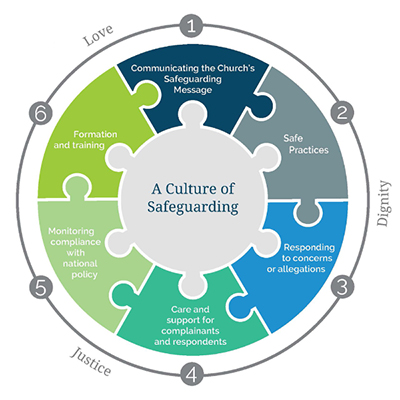 The Society of Mary Professional Standards (Protocol) Committee is a group of experienced professionals who work sensitively with anyone who lays a complaint of sexual abuse or boundary violation against a member of the Society of Mary, the Marist Fathers and Brothers.
The Society of Mary Professional Standards (Protocol) Committee is a group of experienced professionals who work sensitively with anyone who lays a complaint of sexual abuse or boundary violation against a member of the Society of Mary, the Marist Fathers and Brothers.
The Protocol Committee has been operational since 2004.
Membership of the committee changes over time.
Key skill competency comes from people working in allied fields including counselling, therapy, social work, and includes former police officers; a breadth of background and experience is important to draw on.
The membership comprises both Catholics and non-Catholics.
In keeping with the level of professionalism expected from committee members, each has a contract and an appointment time of three years.
The contact person for the committee is Judy, who has a dedicated phone number – 021 909 749.
Complainants always have the option of taking their complaint directly to the Police.
A member, at most three, of the Society of Mary are also on the Committee, whose role is to share their knowledge of the Society’s work, communities and practices.
In order to move towards healing, the Protocol Committee follows the Catholic Church’s victim focused process known as “A Path To Healing”. (PDF)
In brief the process is
- Complaints are received by the committee.
- Two members will be assigned to meet with the complainant to receive their complaint with respect and sensitivity, to offer practical assistance and to explain the process which is to be followed.
- Sometimes a complainant may not want to involve the police, however if the offending is of a criminal nature we encourage people to go to the police and will give them every assistance to do so.
- The Protocol Committee will inform the head of the Society of Mary in New Zealand (the Provincial).
- The committee will also ensure that the accused is told of the complaint.
- The Provincial then stands down the Marist from ministry.
- The Marist is interviewed.
- When an apology is given, it is the Provincial who provides it, often both in person and in writing.
On occasions, the offence might be too historic for the police to act, the Marist priest or brother or may have died or there is not sufficient evidence to support a formal court case.
In cases where the police cannot prosecute or when people chose not to involve the police, the investigation and conclusion is reached by the Protocol Committee.
For some, being heard, believed and the hurt acknowledged can be sufficient.
The Catholic Church also has established a National Office for Professional Standards which overseas complaints that are received about priests and Religious in the Catholic Church.
Periodically the Society of Mary Protocol Committee refers complaints to this body ensuring that all due and proper steps are followed to fully respect the victim and to be sure that everything possible is done in order to achieve a resolution for them.
In November 2018 the Catholic Church’s National Office of Professional Standards published a series of five documents, which along with the Church’s A Path to Healing, outlines a framework of documentation referring to principles, policies and procedures that ensures all Church ministry is undertaken in a safe enviornment and where pastoral practice always inclues a concern for ‘best practice’ regarding them.
- A Culture of Safeguarding (PDF)
- Safeguarding policy (PDF)
- Code of Conduct (PDF)
- Safe Recruitment and Training Policy (PDF)
- Concerns and Complaints Policy (PDF)
- All documents and policies provided by NOPS

